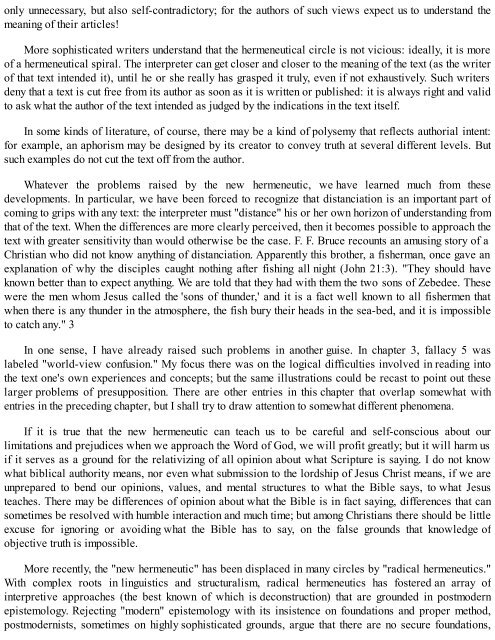Exegetical Fallacies - D. A. Carson
Exegetical Fallacies - D. A. Carson
Exegetical Fallacies - D. A. Carson
Create successful ePaper yourself
Turn your PDF publications into a flip-book with our unique Google optimized e-Paper software.
only unnecessary, but also self-contradictory; for the authors of such views expect us to understand the<br />
meaning of their articles!<br />
More sophisticated writers understand that the hermeneutical circle is not vicious: ideally, it is more<br />
of a hermeneutical spiral. The interpreter can get closer and closer to the meaning of the text (as the writer<br />
of that text intended it), until he or she really has grasped it truly, even if not exhaustively. Such writers<br />
deny that a text is cut free from its author as soon as it is written or published: it is always right and valid<br />
to ask what the author of the text intended as judged by the indications in the text itself.<br />
In some kinds of literature, of course, there may be a kind of polysemy that reflects authorial intent:<br />
for example, an aphorism may be designed by its creator to convey truth at several different levels. But<br />
such examples do not cut the text off from the author.<br />
Whatever the problems raised by the new hermeneutic, we have learned much from these<br />
developments. In particular, we have been forced to recognize that distanciation is an important part of<br />
coming to grips with any text: the interpreter must "distance" his or her own horizon of understanding from<br />
that of the text. When the differences are more clearly perceived, then it becomes possible to approach the<br />
text with greater sensitivity than would otherwise be the case. F. F. Bruce recounts an amusing story of a<br />
Christian who did not know anything of distanciation. Apparently this brother, a fisherman, once gave an<br />
explanation of why the disciples caught nothing after fishing all night (John 21:3). "They should have<br />
known better than to expect anything. We are told that they had with them the two sons of Zebedee. These<br />
were the men whom Jesus called the 'sons of thunder,' and it is a fact well known to all fishermen that<br />
when there is any thunder in the atmosphere, the fish bury their heads in the sea-bed, and it is impossible<br />
to catch any." 3<br />
In one sense, I have already raised such problems in another guise. In chapter 3, fallacy 5 was<br />
labeled "world-view confusion." My focus there was on the logical difficulties involved in reading into<br />
the text one's own experiences and concepts; but the same illustrations could be recast to point out these<br />
larger problems of presupposition. There are other entries in this chapter that overlap somewhat with<br />
entries in the preceding chapter, but I shall try to draw attention to somewhat different phenomena.<br />
If it is true that the new hermeneutic can teach us to be careful and self-conscious about our<br />
limitations and prejudices when we approach the Word of God, we will profit greatly; but it will harm us<br />
if it serves as a ground for the relativizing of all opinion about what Scripture is saying. I do not know<br />
what biblical authority means, nor even what submission to the lordship of Jesus Christ means, if we are<br />
unprepared to bend our opinions, values, and mental structures to what the Bible says, to what Jesus<br />
teaches. There may be differences of opinion about what the Bible is in fact saying, differences that can<br />
sometimes be resolved with humble interaction and much time; but among Christians there should be little<br />
excuse for ignoring or avoiding what the Bible has to say, on the false grounds that knowledge of<br />
objective truth is impossible.<br />
More recently, the "new hermeneutic" has been displaced in many circles by "radical hermeneutics."<br />
With complex roots in linguistics and structuralism, radical hermeneutics has fostered an array of<br />
interpretive approaches (the best known of which is deconstruction) that are grounded in postmodern<br />
epistemology. Rejecting "modern" epistemology with its insistence on foundations and proper method,<br />
postmodernists, sometimes on highly sophisticated grounds, argue that there are no secure foundations,



